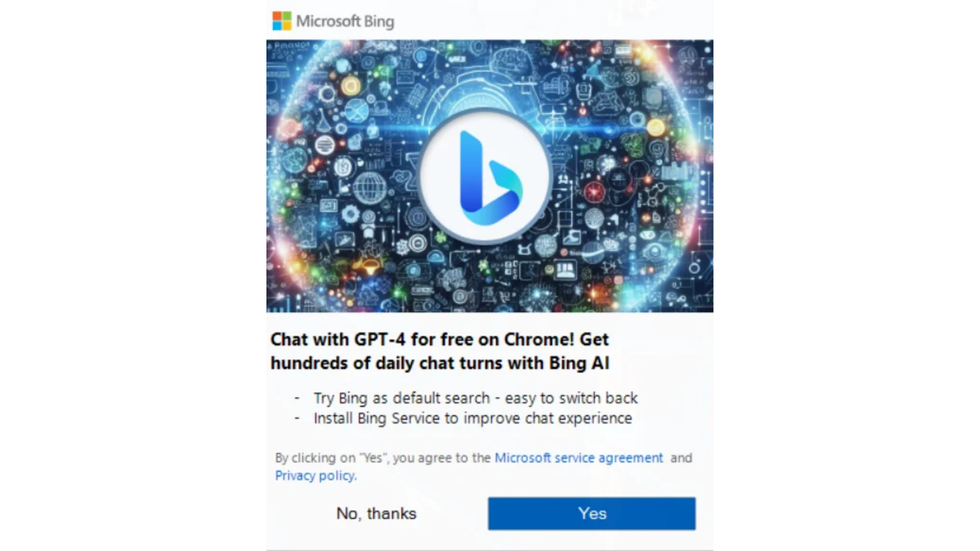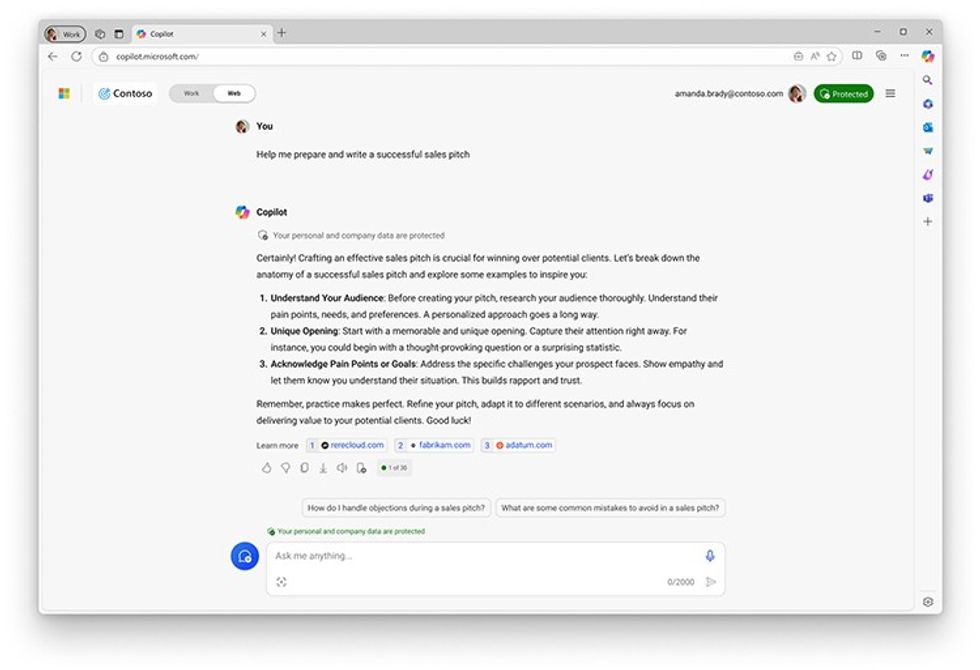Exasperated Chrome web browser users are being shown pop-up adverts for Bing search from Microsoft in its latest campaign to push users to switch away from Google services
MICROSOFT | GETTY IMAGES | REDDIT
Latest pop-up campaign is designed to push users to switch from Google to Bing
- Microsoft has started a fresh campaign of pop-up adverts
- These appear in Google Chrome, the world's most popular browser
- The ads suggest switching to Bing search
- Some confused Chrome users mistook the pop-up for malware
Don't Miss
Most Read
Trending on GB News
If you’ve been interrupted by a pop-up advert for Bing and Microsoft Copilot when trying to browse the web in Google Chrome — you’re not alone.
Microsoft has started to inject pop-up adverts into Chrome, the world’s most popular web browser, in a desperate bid to get PC owners to switch to Bing.

An example of the pop-up advertisement that's showing up in the Google Chrome web browser on Windows 10 and Windows 11
REDDIT | THEDYSLEXICCOW
One confused Windows 10 user shared a screenshot of the pop-up on social news website Reddit, asking “Is this Microsoft Bing Popup malware?”
Posting in a forum dedicated to antivirus software, Reddit user TheDyslexicCow shared a screenshot and asked: “Just randomly popped up on my desktop today, I couldn't find anything unusual in the task manager and computer is running fine. Is it just an ad from Microsoft?”
And that user isn’t alone.
In recent days, there has been a growing number of reports of Windows 10 and Windows 11 users spotting these advertisements appear when using software from rival technology giant Google. There are two options on the pop-up: “No, thanks” and “Yes”.
If you click the latter, Microsoft will set Bing as the default search engine within Google Chrome.
To do that, Microsoft will install the designated “Bing Search” extension to Google Chrome. But Google is wise to these pushy tactics and is you click “Yes” on the pop-up from Microsoft, the Californian search firm will launch its own pop-up asking if you really want to switch search engines.
“Did you mean to change your search provider? The ‘Microsoft Bing Search for Chrome’ extension changed search to use bing.com,” Google warns in the Chrome window.
Unbelievably, this triggers another pop-up from Microsoft that reads: “Wait — don’t change it back! If you do, you’ll turn off Microsoft Bing Search for Chrome and lose access to Bing Al with GPT-4 and DALL-E 3. Select Keep it to stay with Microsoft Bing.”
The warring pop-ups from Microsoft and Google, worth $3.09 trillion and $1.76 trillion respectively, show just how critical your default search engine is to both of their business models.
Microsoft confirmed to The Verge that these advertisements are not malware and are a genuine marketing push from the company. Users should only see them once, the company promises.
“This is a one-time notification giving people the choice to set Bing as their default search engine on Chrome,” Caitlin Roulston, Director of Communications for Microsoft, reassured in a statement to The Verge. “We value providing our customers with choice, so there is an option to dismiss the notification.”
Unfortunately, there’s no way to disable these advertisements for good, so you’re not going to put up with them at least once if you use Google Chrome and the competitor’s search engine.
Bing was launched in June 2009 to compete head-to-head with Google, but has struggled to gain traction in the last 15 years.

Microsoft Copilot, the brand used for its ChatGPT-powered AI features, will answer your prompts with full sentences, unlike a traditional search engine, which presents a ranked list of links to other sources
MICROSOFT PRESS OFFICE
With its most recent overhaul, Microsoft poured the capabilities of OpenAI’s ChatGPT into its search engine. This enables Bing to respond with full sentences — putting together itineraries for a city break, step-by-step recipe, or a quick summary of an event.
It’s this advantage over Google that Microsoft is pushing so hard in the advertisement. “Chat with GPT-4 for free on Chrome,” it reads. “Get hundreds of daily chat turns with Bing AI”.
Microsoft has spent an eye-watering amount of money funding OpenAI for its clever Artificial Intelligence (AI) smarts, with its total investment so far rumoured to be around $13 billion. The Redmond-based company was infamously late to wake up to the smartphone revolution, with then-CEO Steve Ballmer laughing at the first-generation iPhone. It's desperate not to miss the push towards AI.
ChatGPT now permeates through almost every part of its portfolio, with Bing now offering the same functionality as the OpenAI chatbot, Microsoft Edge offering one-click access to AI, and Copilot able to put together Powerpoint presentations and dream-up formulae in Excel based on your prompts.
Some of these features are locked behind a £19 per month subscription, likely so Microsoft can recoup some of that investment.
LATEST DEVELOPMENTS
- Malfunctioning WhatsApp saves photos TWICE on iPhone
- Microsoft just released EU-only versions of Windows 10 and 11
- BBC iPlayer has blocked downloads on millions of laptops
Unfortunately, spreading awareness of these clever ChatGPT-like features has taken the form of unwanted pop-up adverts in the world's most popular web browser.
The latest intrusion for Windows users comes just a few weeks after Windows 10 turned on their PCs to find a fullscreen advertisement pushing them to upgrade to Windows 11, something millions of laptop and desktop PC owners are unable to do — leaving them looking at a costly subscription to ensure their data is safely protected from hackers and malware.








